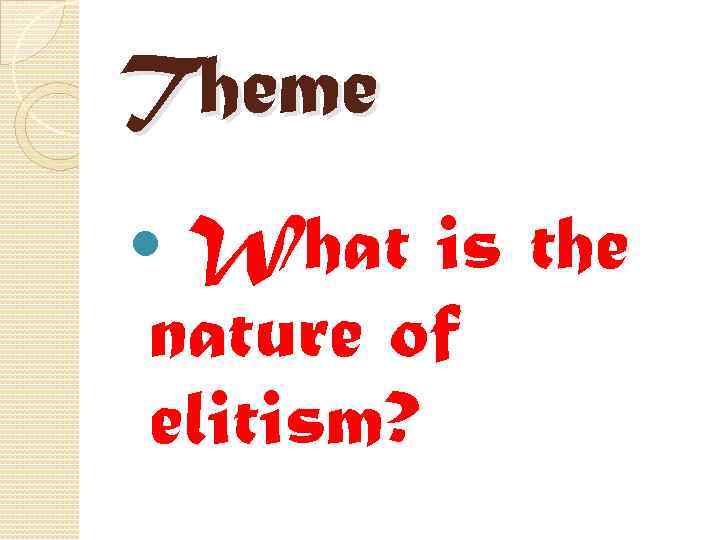 Theme What is the nature of elitism?
Theme What is the nature of elitism?
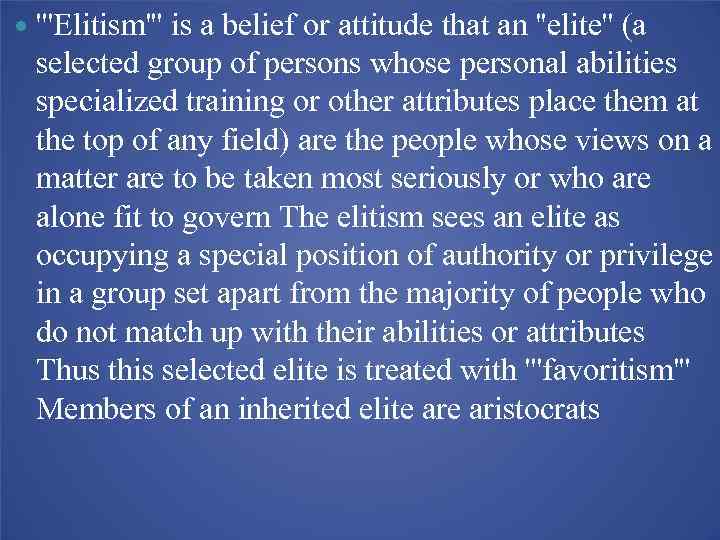 '''Elitism''' is a belief or attitude that an ''elite'' (a selected group of persons whose personal abilities specialized training or other attributes place them at the top of any field) are the people whose views on a matter are to be taken most seriously or who are alone fit to govern The elitism sees an elite as occupying a special position of authority or privilege in a group set apart from the majority of people who do not match up with their abilities or attributes Thus this selected elite is treated with '''favoritism''' Members of an inherited elite aristocrats
'''Elitism''' is a belief or attitude that an ''elite'' (a selected group of persons whose personal abilities specialized training or other attributes place them at the top of any field) are the people whose views on a matter are to be taken most seriously or who are alone fit to govern The elitism sees an elite as occupying a special position of authority or privilege in a group set apart from the majority of people who do not match up with their abilities or attributes Thus this selected elite is treated with '''favoritism''' Members of an inherited elite aristocrats
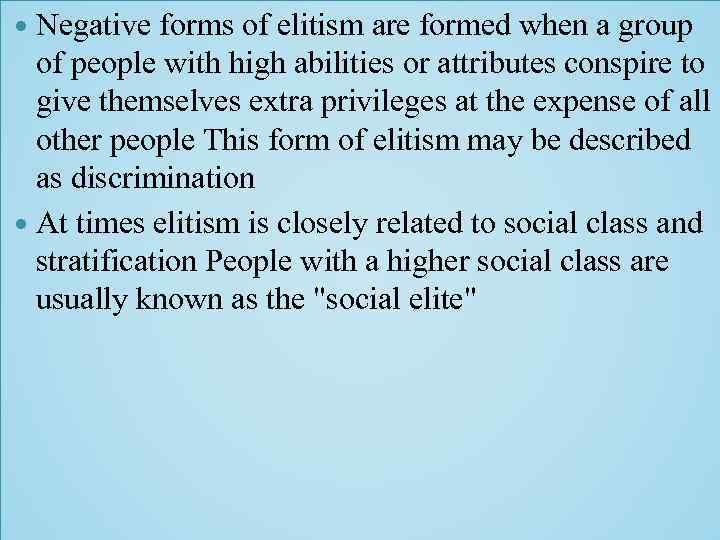 Negative forms of elitism are formed when a group of people with high abilities or attributes conspire to give themselves extra privileges at the expense of all other people This form of elitism may be described as discrimination At times elitism is closely related to social class and stratification People with a higher social class are usually known as the "social elite"
Negative forms of elitism are formed when a group of people with high abilities or attributes conspire to give themselves extra privileges at the expense of all other people This form of elitism may be described as discrimination At times elitism is closely related to social class and stratification People with a higher social class are usually known as the "social elite"
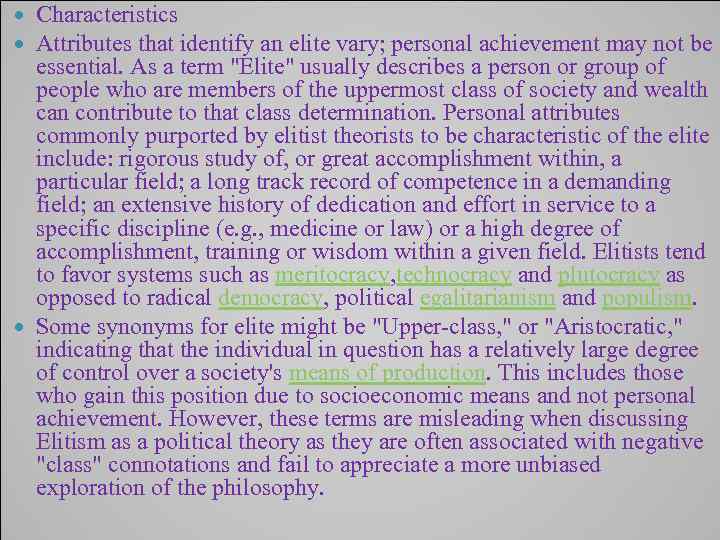 Characteristics Attributes that identify an elite vary; personal achievement may not be essential. As a term "Elite" usually describes a person or group of people who are members of the uppermost class of society and wealth can contribute to that class determination. Personal attributes commonly purported by elitist theorists to be characteristic of the elite include: rigorous study of, or great accomplishment within, a particular field; a long track record of competence in a demanding field; an extensive history of dedication and effort in service to a specific discipline (e. g. , medicine or law) or a high degree of accomplishment, training or wisdom within a given field. Elitists tend to favor systems such as meritocracy, technocracy and plutocracy as opposed to radical democracy, political egalitarianism and populism. Some synonyms for elite might be "Upper-class, " or "Aristocratic, " indicating that the individual in question has a relatively large degree of control over a society's means of production. This includes those who gain this position due to socioeconomic means and not personal achievement. However, these terms are misleading when discussing Elitism as a political theory as they are often associated with negative "class" connotations and fail to appreciate a more unbiased exploration of the philosophy.
Characteristics Attributes that identify an elite vary; personal achievement may not be essential. As a term "Elite" usually describes a person or group of people who are members of the uppermost class of society and wealth can contribute to that class determination. Personal attributes commonly purported by elitist theorists to be characteristic of the elite include: rigorous study of, or great accomplishment within, a particular field; a long track record of competence in a demanding field; an extensive history of dedication and effort in service to a specific discipline (e. g. , medicine or law) or a high degree of accomplishment, training or wisdom within a given field. Elitists tend to favor systems such as meritocracy, technocracy and plutocracy as opposed to radical democracy, political egalitarianism and populism. Some synonyms for elite might be "Upper-class, " or "Aristocratic, " indicating that the individual in question has a relatively large degree of control over a society's means of production. This includes those who gain this position due to socioeconomic means and not personal achievement. However, these terms are misleading when discussing Elitism as a political theory as they are often associated with negative "class" connotations and fail to appreciate a more unbiased exploration of the philosophy.
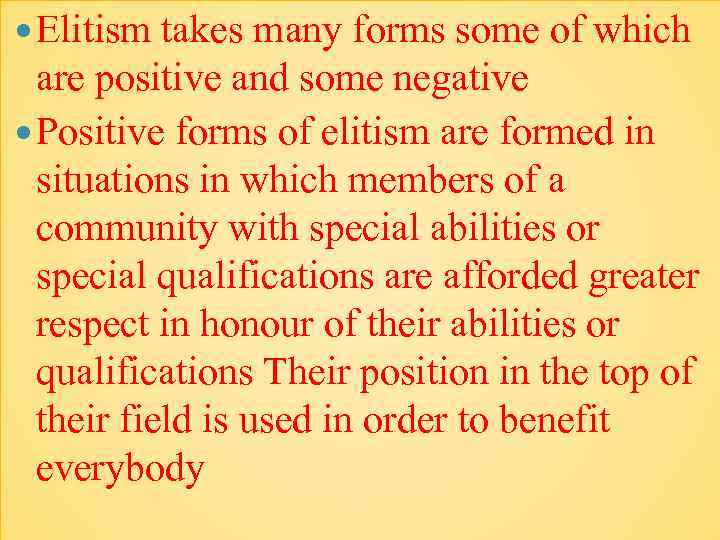 Elitism takes many forms some of which are positive and some negative Positive forms of elitism are formed in situations in which members of a community with special abilities or special qualifications are afforded greater respect in honour of their abilities or qualifications Their position in the top of their field is used in order to benefit everybody
Elitism takes many forms some of which are positive and some negative Positive forms of elitism are formed in situations in which members of a community with special abilities or special qualifications are afforded greater respect in honour of their abilities or qualifications Their position in the top of their field is used in order to benefit everybody
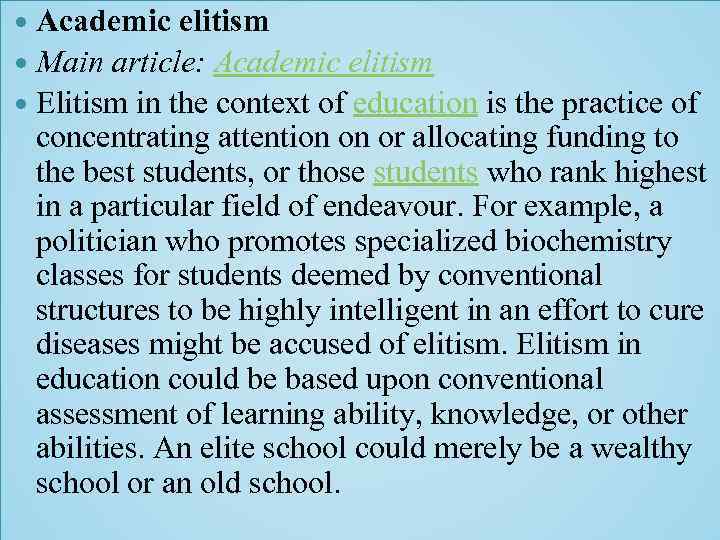 Academic elitism Main article: Academic elitism Elitism in the context of education is the practice of concentrating attention on or allocating funding to the best students, or those students who rank highest in a particular field of endeavour. For example, a politician who promotes specialized biochemistry classes for students deemed by conventional structures to be highly intelligent in an effort to cure diseases might be accused of elitism. Elitism in education could be based upon conventional assessment of learning ability, knowledge, or other abilities. An elite school could merely be a wealthy school or an old school.
Academic elitism Main article: Academic elitism Elitism in the context of education is the practice of concentrating attention on or allocating funding to the best students, or those students who rank highest in a particular field of endeavour. For example, a politician who promotes specialized biochemistry classes for students deemed by conventional structures to be highly intelligent in an effort to cure diseases might be accused of elitism. Elitism in education could be based upon conventional assessment of learning ability, knowledge, or other abilities. An elite school could merely be a wealthy school or an old school.
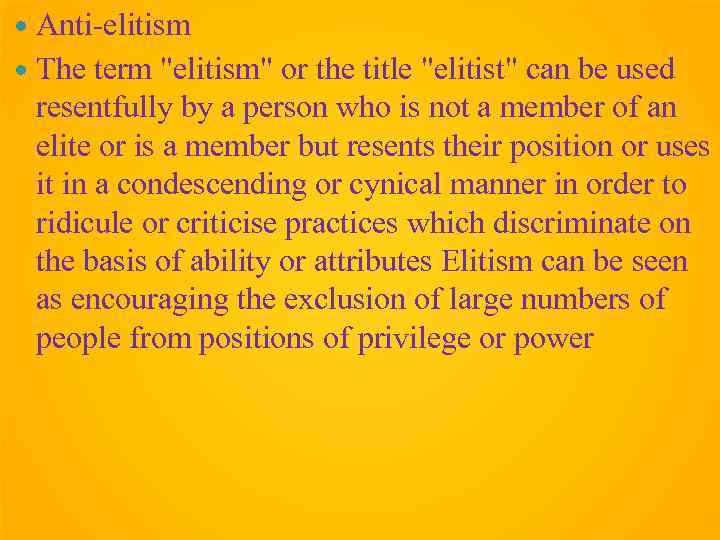 Anti-elitism The term "elitism" or the title "elitist" can be used resentfully by a person who is not a member of an elite or is a member but resents their position or uses it in a condescending or cynical manner in order to ridicule or criticise practices which discriminate on the basis of ability or attributes Elitism can be seen as encouraging the exclusion of large numbers of people from positions of privilege or power
Anti-elitism The term "elitism" or the title "elitist" can be used resentfully by a person who is not a member of an elite or is a member but resents their position or uses it in a condescending or cynical manner in order to ridicule or criticise practices which discriminate on the basis of ability or attributes Elitism can be seen as encouraging the exclusion of large numbers of people from positions of privilege or power
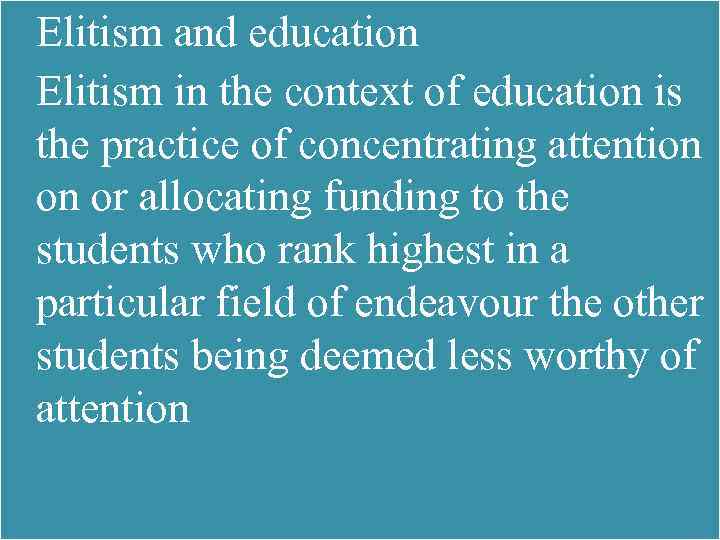 Elitism and education Elitism in the context of education is the practice of concentrating attention on or allocating funding to the students who rank highest in a particular field of endeavour the other students being deemed less worthy of attention
Elitism and education Elitism in the context of education is the practice of concentrating attention on or allocating funding to the students who rank highest in a particular field of endeavour the other students being deemed less worthy of attention
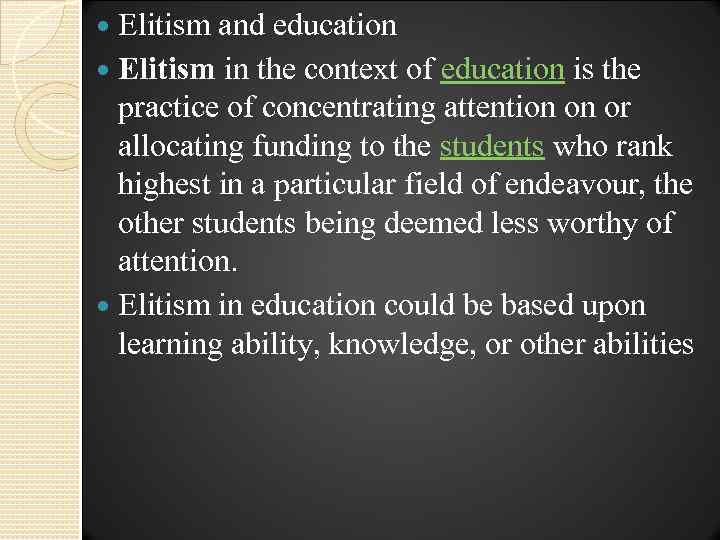 Elitism and education Elitism in the context of education is the practice of concentrating attention on or allocating funding to the students who rank highest in a particular field of endeavour, the other students being deemed less worthy of attention. Elitism in education could be based upon learning ability, knowledge, or other abilities
Elitism and education Elitism in the context of education is the practice of concentrating attention on or allocating funding to the students who rank highest in a particular field of endeavour, the other students being deemed less worthy of attention. Elitism in education could be based upon learning ability, knowledge, or other abilities
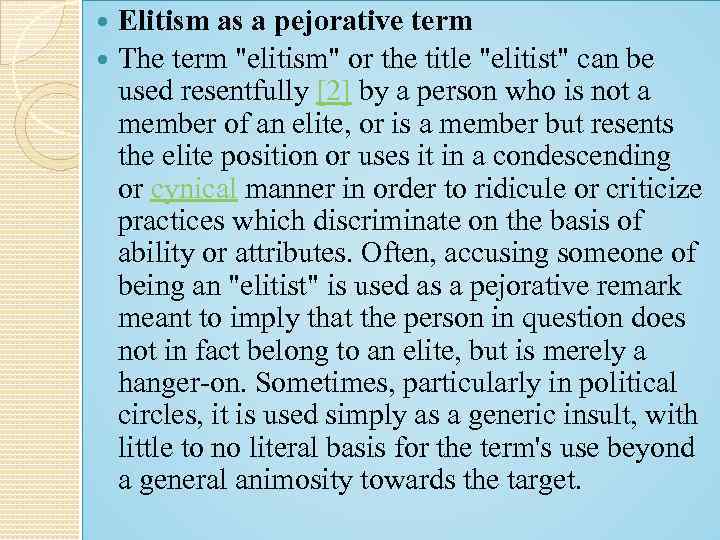 Elitism as a pejorative term The term "elitism" or the title "elitist" can be used resentfully [2] by a person who is not a member of an elite, or is a member but resents the elite position or uses it in a condescending or cynical manner in order to ridicule or criticize practices which discriminate on the basis of ability or attributes. Often, accusing someone of being an "elitist" is used as a pejorative remark meant to imply that the person in question does not in fact belong to an elite, but is merely a hanger-on. Sometimes, particularly in political circles, it is used simply as a generic insult, with little to no literal basis for the term's use beyond a general animosity towards the target.
Elitism as a pejorative term The term "elitism" or the title "elitist" can be used resentfully [2] by a person who is not a member of an elite, or is a member but resents the elite position or uses it in a condescending or cynical manner in order to ridicule or criticize practices which discriminate on the basis of ability or attributes. Often, accusing someone of being an "elitist" is used as a pejorative remark meant to imply that the person in question does not in fact belong to an elite, but is merely a hanger-on. Sometimes, particularly in political circles, it is used simply as a generic insult, with little to no literal basis for the term's use beyond a general animosity towards the target.
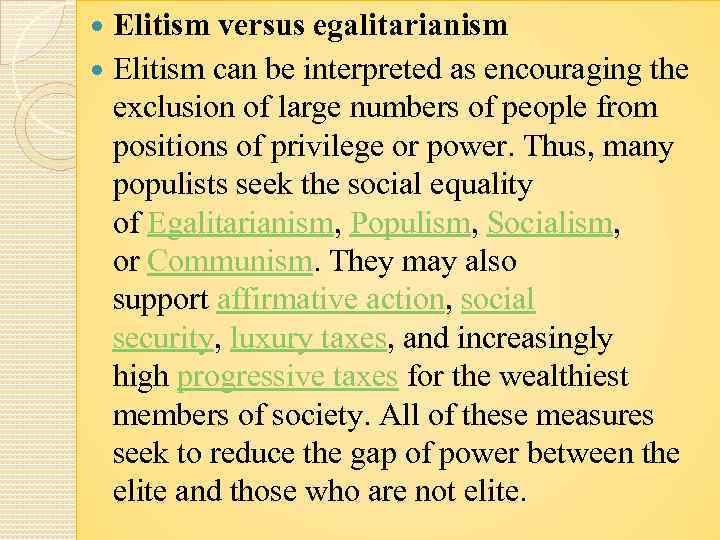 Elitism versus egalitarianism Elitism can be interpreted as encouraging the exclusion of large numbers of people from positions of privilege or power. Thus, many populists seek the social equality of Egalitarianism, Populism, Socialism, or Communism. They may also support affirmative action, social security, luxury taxes, and increasingly high progressive taxes for the wealthiest members of society. All of these measures seek to reduce the gap of power between the elite and those who are not elite.
Elitism versus egalitarianism Elitism can be interpreted as encouraging the exclusion of large numbers of people from positions of privilege or power. Thus, many populists seek the social equality of Egalitarianism, Populism, Socialism, or Communism. They may also support affirmative action, social security, luxury taxes, and increasingly high progressive taxes for the wealthiest members of society. All of these measures seek to reduce the gap of power between the elite and those who are not elite.
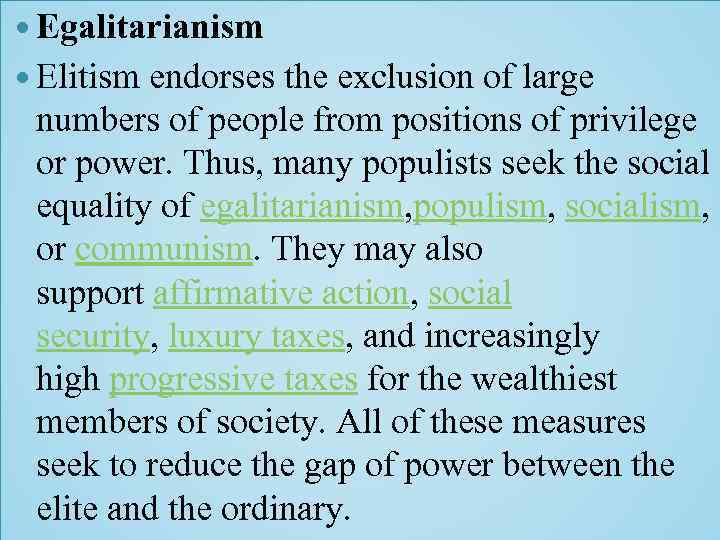 Egalitarianism Elitism endorses the exclusion of large numbers of people from positions of privilege or power. Thus, many populists seek the social equality of egalitarianism, populism, socialism, or communism. They may also support affirmative action, social security, luxury taxes, and increasingly high progressive taxes for the wealthiest members of society. All of these measures seek to reduce the gap of power between the elite and the ordinary.
Egalitarianism Elitism endorses the exclusion of large numbers of people from positions of privilege or power. Thus, many populists seek the social equality of egalitarianism, populism, socialism, or communism. They may also support affirmative action, social security, luxury taxes, and increasingly high progressive taxes for the wealthiest members of society. All of these measures seek to reduce the gap of power between the elite and the ordinary.
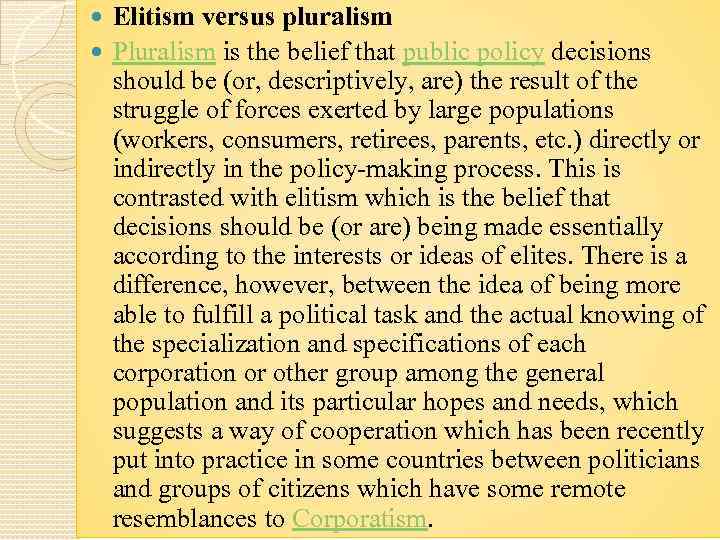 Elitism versus pluralism Pluralism is the belief that public policy decisions should be (or, descriptively, are) the result of the struggle of forces exerted by large populations (workers, consumers, retirees, parents, etc. ) directly or indirectly in the policy-making process. This is contrasted with elitism which is the belief that decisions should be (or are) being made essentially according to the interests or ideas of elites. There is a difference, however, between the idea of being more able to fulfill a political task and the actual knowing of the specialization and specifications of each corporation or other group among the general population and its particular hopes and needs, which suggests a way of cooperation which has been recently put into practice in some countries between politicians and groups of citizens which have some remote resemblances to Corporatism.
Elitism versus pluralism Pluralism is the belief that public policy decisions should be (or, descriptively, are) the result of the struggle of forces exerted by large populations (workers, consumers, retirees, parents, etc. ) directly or indirectly in the policy-making process. This is contrasted with elitism which is the belief that decisions should be (or are) being made essentially according to the interests or ideas of elites. There is a difference, however, between the idea of being more able to fulfill a political task and the actual knowing of the specialization and specifications of each corporation or other group among the general population and its particular hopes and needs, which suggests a way of cooperation which has been recently put into practice in some countries between politicians and groups of citizens which have some remote resemblances to Corporatism.
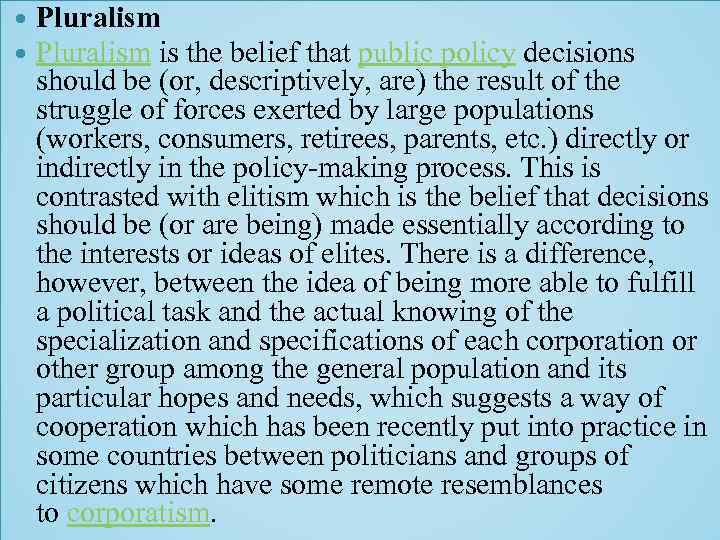 Pluralism is the belief that public policy decisions should be (or, descriptively, are) the result of the struggle of forces exerted by large populations (workers, consumers, retirees, parents, etc. ) directly or indirectly in the policy-making process. This is contrasted with elitism which is the belief that decisions should be (or are being) made essentially according to the interests or ideas of elites. There is a difference, however, between the idea of being more able to fulfill a political task and the actual knowing of the specialization and specifications of each corporation or other group among the general population and its particular hopes and needs, which suggests a way of cooperation which has been recently put into practice in some countries between politicians and groups of citizens which have some remote resemblances to corporatism.
Pluralism is the belief that public policy decisions should be (or, descriptively, are) the result of the struggle of forces exerted by large populations (workers, consumers, retirees, parents, etc. ) directly or indirectly in the policy-making process. This is contrasted with elitism which is the belief that decisions should be (or are being) made essentially according to the interests or ideas of elites. There is a difference, however, between the idea of being more able to fulfill a political task and the actual knowing of the specialization and specifications of each corporation or other group among the general population and its particular hopes and needs, which suggests a way of cooperation which has been recently put into practice in some countries between politicians and groups of citizens which have some remote resemblances to corporatism.


